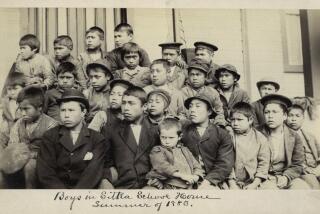A smaller school is bigger in memory
It’s weird to pick up the Sunday paper and feel like you’re reading from the musty diary of your own life. Being of a certain age, I’ve relegated my boyhood in small-town Marquette, Neb., to a time capsule, painfully aware that those days belong to an era so dated that paleontologists may soon be naming it.
But there it was in the doggone Los Angeles Times, rooted in the here and now in pseudo-chic Orange County.
The story: Silverado Elementary, a mighty mite of a school with only 93 students and four teachers, may close. It’s by no means decided, but the Orange Unified School District in which it resides is looking for ways to stretch its money. Operating such a small school, with its inflated per-pupil spending, makes no sense to budget-crunchers.
To someone like me, it makes perfect sense. And, no doubt, to many of the Silverado parents who send their kids to a school that represents an ever-thinning slice of Americana.
“Talk to anyone who has gone there, and they’ll tell you it was always such a cherished time,” said a mom whose two sons had attended Silverado.
Lots of people rhapsodize when talking about their childhood experiences, sometimes annoyingly so. But places like Marquette and Silverado stick in our memories with more tenacity because society so long ago rendered them obsolete. We belong to a group of people whose childhoods have been torn down.
Marquette, about 125 miles west of Omaha, had 200 people when we lived there. The school was K-12, with the new wing attached to the old one by a breezeway that, even then, seemed to connect vastly different eras.
A sentimental old fool even at 11, I liked the old building more than the new one. The floors creaked, the dark and dusty gym in the basement next to the boiler room looked like something from an Edgar Allen Poe story, and it was always a kick to take the fire escape from the second floor to the ground. Why? Because the fire escape didn’t have steps; it was an enclosed metallic tube that you slid down.
I lived in Marquette from third through sixth grade, and on some days took a shortcut through a cornfield to get to school. We built forts and treehouses and had pitched battles with dirt clods and corncobs as our standard weapons of choice. The buildings “uptown” were so close together that we could jump rooftop to rooftop while waging water balloon fights.
Marquette High School had 38 kids in 1961, the year we left. The baby boomers were coming up fast, however, because K-8 had 160 students. My class held pretty steady around 15 during my four years, with most of them living on farms.
I can still name my classmates.
Of course, it takes the passage of time for things to register. I’m sure I never once said en route to school, “Lucky me, I’m walking through a cornfield.” Or that I felt especially fortunate at the time to catch enough tadpoles from a local pond to fill up an ice cream container.
Only much later did those moments assume gilded status.
A few months after leaving Marquette, I was a frightened seventh-grader at Monroe Junior High in Omaha. The Silverado parent must have been reading my diary when she told Times reporter Mike Anton: “The children, when they gear up to go to junior high or high school, a lot of them are scared. They know they’re going to a school with over a thousand kids and they’ll be part of the shuffle of human bodies and will lose the personal identity and security they have at this school.”
Monroe had 1,000 students. I pounded pavement to get there. The first day in class, another boy laughed out loud because I had a girl’s name. Instead of corncobs, the preferred weapon at Monroe was fists. Within the first few weeks, my locker mate stole my colored pencil set, and I was too wimpy to demand it back. Exchanging Marquette for Omaha was like trading a gum ball for rock cocaine.
OK, I survived, even though my parents denied my request to change my name to Attila. They probably thought my glasses would kill the effect.
The junior high years weren’t unpleasant, they just came and went. All these years later, it’s Marquette I recall with fondness and not Monroe.
I can’t put a year to it, but I remember the first time I went back to Marquette and saw the empty ground where the old building had stood. No longer needed, it had been razed. It was like a theft -- somebody took something that belonged to me, and I wasn’t going to get it back.
So, I feel like a kindred spirit with the Silverado parents. It’s not my place to lobby for them, and in fact, the next generation of kids in canyon territory may not care whether they go to school there or somewhere in Orange.
You can’t blame them for not knowing what they’d be missing.
You have to be a grown-up to understand that.
--
Dana Parsons’ column appears Tuesdays, Thursdays and Saturdays. He can be reached at (714) 966-7821 or at dana.parsons@latimes.com. An archive of his recent columns is at www.latimes.com/parsons.


